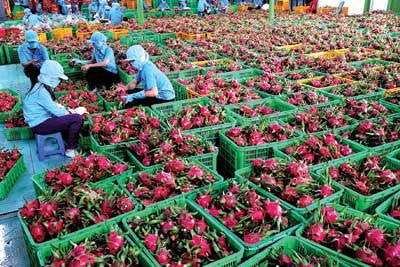Agricultural exports remain a difficult problem
Vietnam does not have many high-tech agricultural products, leading to low competitiveness of export products.
 |
| The competitiveness of Vietnamese export goods is still low. |
Vietnam is the world's leading agricultural exporter, with many products reaching a turnover value of more than one billion USD per year. However, for many years now, the refrain of "good harvest, low price" has been continuously occurring, farmers always have to face the worry of uncertain product output. Conquering the domestic market and finding ways to export agricultural products abroad is a difficult problem for people and export enterprises today.
According to statistics from the Ministry of Agriculture and Rural Development, in February, the country's agricultural, forestry and fishery export turnover reached more than 1.7 billion USD, bringing the industry's export value in the first two months of this year to more than 4.17 billion USD, down 1.9% over the same period last year. This is a consecutive decrease in the first two months of the year. It is worth noting that the export turnover of most agricultural products has decreased significantly, especially the industries that are considered strengths in the industry's export sector such as seafood, rice, coffee, etc.
The competitiveness of Vietnam's export products is still low. (Photo: KT) According to economic experts, one of the reasons for the recent decline in Vietnam's agricultural export output is that the marketing capacity of Vietnamese enterprises is still poor, and there are not many high-tech agricultural products, leading to low competitiveness of export products.
Most of our country's agricultural products are exported in raw or semi-processed form, while the price is high, the quality is low, and the designs are not attractive. These are not small challenges for Vietnamese agricultural products when participating in a large but difficult and fiercely competitive playing field.
Mr. Ha Ngoc Tuyen, Deputy Director of Cao Phong-Hoa Binh One Member Co., Ltd., said that it is necessary to have the help of all levels and sectors in the production stage. Because closed, clean production, using scientific and non-toxic processing technology, will increase the value of exported agricultural products. If people are left to choose, process or make their own products by word of mouth, they will not be able to meet the needs of export.
In reality, Vietnam’s agricultural exports are still mainly in raw form and aimed at easy-going markets. Penetrating large markets such as the European Union, Japan, South Korea, etc. is still very difficult for Vietnamese businesses.
Up to this point, our country has almost completely opened the agricultural market in the ASEAN region. Import tax on agricultural products is 0%, which will create pressure on producers, especially some products that are protected by the State.
Mr. Nguyen Tien Vuong, Deputy General Director of Hanoi-Hapro Trading Corporation, said that exporting agricultural products abroad is still a difficult problem for farmers and businesses. However, if people have full market information and comply with the correct production process, exporting agricultural products will be successful.
“Exporting agricultural products abroad requires a separate process. Exporting units often have fixed items, some items have orders from abroad such as Hapro has also successfully exported agricultural products. With dragon fruit, rice... enterprises can directly export, however, for large shipments in containers, there needs to be an agency to guide people to follow the process, and placing orders according to the process will make exporting more convenient,” Mr. Vuong said.
According to Mr. Luu Bich Ho, former Director of the Institute of Development Strategy (Ministry of Planning and Investment), to successfully export agricultural products, first of all, enterprises need to participate in the agricultural production value chain. Because currently, the role of enterprises in providing inputs and solving outputs is not good, enterprises often charge farmers higher prices than their capabilities, moreover, processing costs are high, causing disadvantages for farmers.
Therefore, to solve the problem of agricultural exports, the first thing to do is to put the issue of "market information" first. Currently, not only farmers but also manufacturers do not fully grasp market information, do not invest properly in market investigation and research, but only chase seasonal orders...
Mr. Luu Bich Ho said that in order to export goods to demanding markets, manufacturers must carefully research the tastes, preferences, and consumption habits of customers, and then organize large-scale production to meet the needs of that market.
“One of the important factors to determine the success of agricultural exports is the efforts of farmers in production and improving the quality of agricultural products. The State must be more determined to implement policies on restructuring and industrialization of rural agriculture, considering it a very important and decisive point for us to successfully carry out industrialization,” Mr. Luu Bich Ho affirmed.
In 2015, many opportunities will open up for Vietnamese agricultural products when the Free Trade Agreement is implemented. Agricultural businesses can easily expand their market share into large regional and international markets, benefit from a number of tax exemptions, large market demand and foreign consumers' preference for some Vietnamese agricultural products.
Therefore, to overcome challenges and trade barriers, businesses themselves must improve their competitiveness, focus on building product brands, and increase the value of Vietnamese agricultural products.
According to VOV.VN






